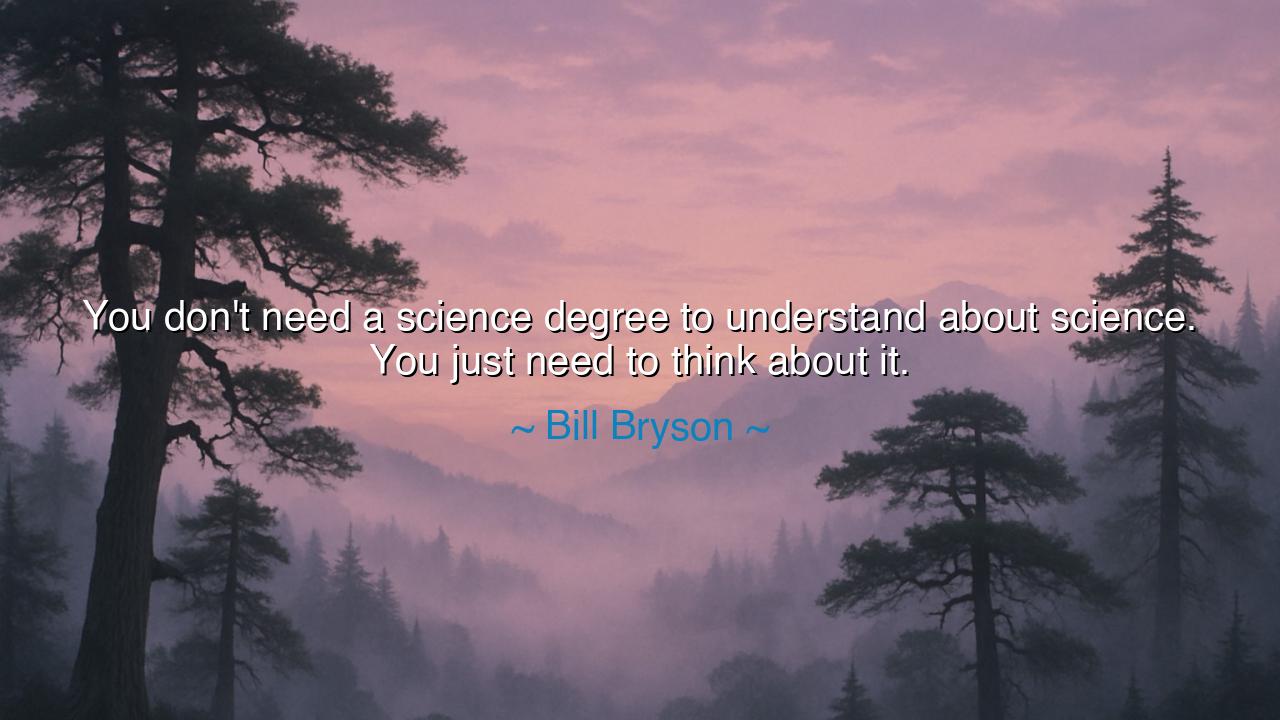
You don't need a science degree to understand about science. You
You don't need a science degree to understand about science. You just need to think about it.






Hear this, O children of the world, for the great Bill Bryson speaks a truth as old as the stars themselves. "You don't need a science degree to understand about science," he declares, "You just need to think about it." These words, simple yet profound, carry within them the essence of all human inquiry. They remind us that science is not a realm reserved only for the learned or the specialized; it is a pursuit open to all who wonder, to all who are willing to think. For the greatest discoveries, the most profound insights, are not always found in the halls of academia, but in the mind of any man or woman willing to ask, to ponder, and to explore the mysteries of the world around them.
Think, O seekers of wisdom, of the ancient philosophers who first gazed upon the heavens and asked, "What are these stars?" and "What is the nature of this world?" They did not possess the tools of modern science, nor the degrees that we hold in such high esteem today, yet they unlocked truths that still guide us. Socrates, the wisest of all men, did not rely upon the rigid teachings of others. Instead, he asked questions that were simple, yet profound. He engaged the world with the power of thought, seeking understanding not through the application of learned facts, but through the act of inquiry itself. And so, too, must we. Science is born from the act of questioning the world, of seeking answers with an open and unclouded mind.
Consider, O children, the story of Galileo Galilei, who gazed through his telescope and saw the moon and the stars in ways no man had seen before. He did not need the approval of kings or scholars to ask his questions. He simply looked up and wondered. With that act of thinking, he changed the course of human history. Galileo’s genius lay not in his education alone, but in his unwillingness to accept what was handed to him by others. He thought, and in thinking, he saw the universe anew. This is the heart of science: it is not the accumulation of knowledge alone, but the act of engaging with the world through the lens of curiosity and thought.
Bryson’s words, then, are a call to arms—not for weapons, but for the weapon of the mind. To understand science is not to wield formulas and equations, but to think critically, to engage with the world and ask the right questions. It is a reminder that understanding does not come from memorizing facts but from pondering the questions that arise when we observe the world. Think about the sun and its heat, and the mystery of the stars—do you not begin to feel the pull of something greater than yourself, a force that invites you to question and seek? This, O children, is the essence of science.
There is a powerful lesson here for all of us. We live in a world where knowledge is often compartmentalized, and many believe that true understanding of the natural world lies behind the doors of universities and laboratories. But Bryson teaches us otherwise. He reminds us that the mysteries of the universe are not beyond our grasp. They are right before us, waiting to be understood. It is not the tools we possess that define our ability to explore the world, but the depth of our thought. Thinking deeply about the world, asking questions, and seeking answers—this is what will unlock the greatest treasures of knowledge.
And so, O children, let us take this truth to heart. Let us engage the world with curiosity and wonder, not bound by the need for formal education, but fueled by the simple power of thought. When you look upon the natural world, ask yourself: What makes the seasons change? How do the winds blow? What is the nature of the earth beneath our feet? Do not be content to simply accept what others say, but look deeper. The act of thinking, of questioning, is the key to unlocking the mysteries that surround us.
In your own lives, approach the world with the eyes of a child, filled with wonder, and the mind of a philosopher, filled with questions. You need not wear the robes of the scholar to understand the world. You need only to think. Let your thoughts be the seed from which the greatest discoveries grow, for in the simple act of thinking, we find the power to understand and to shape the world in ways we never imagined. The universe is vast, and its mysteries are boundless, but it is within the grasp of every one of us to understand it—if only we have the courage to think.






AAdministratorAdministrator
Welcome, honored guests. Please leave a comment, we will respond soon